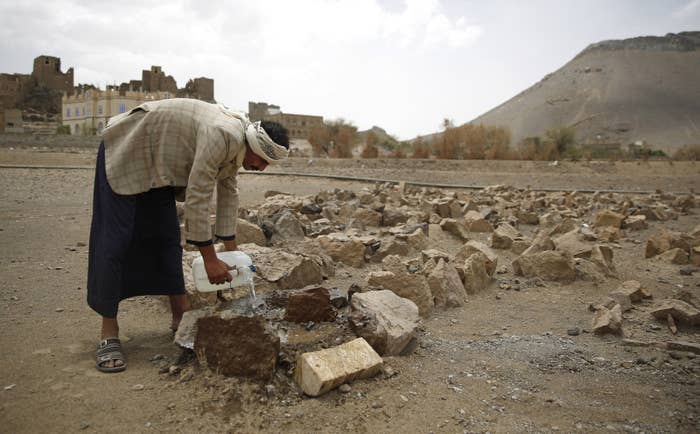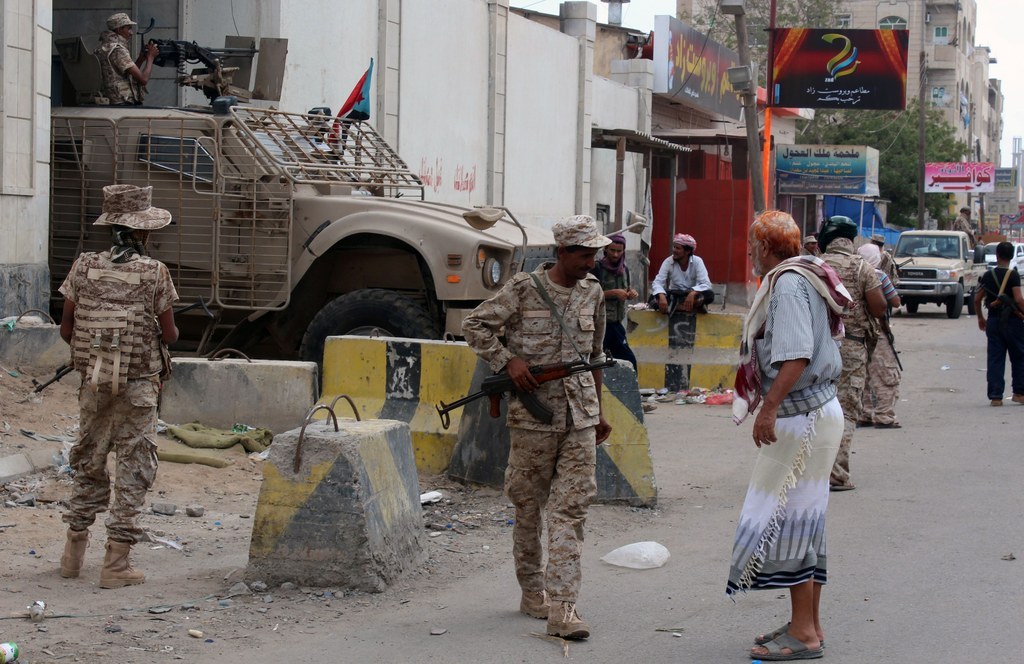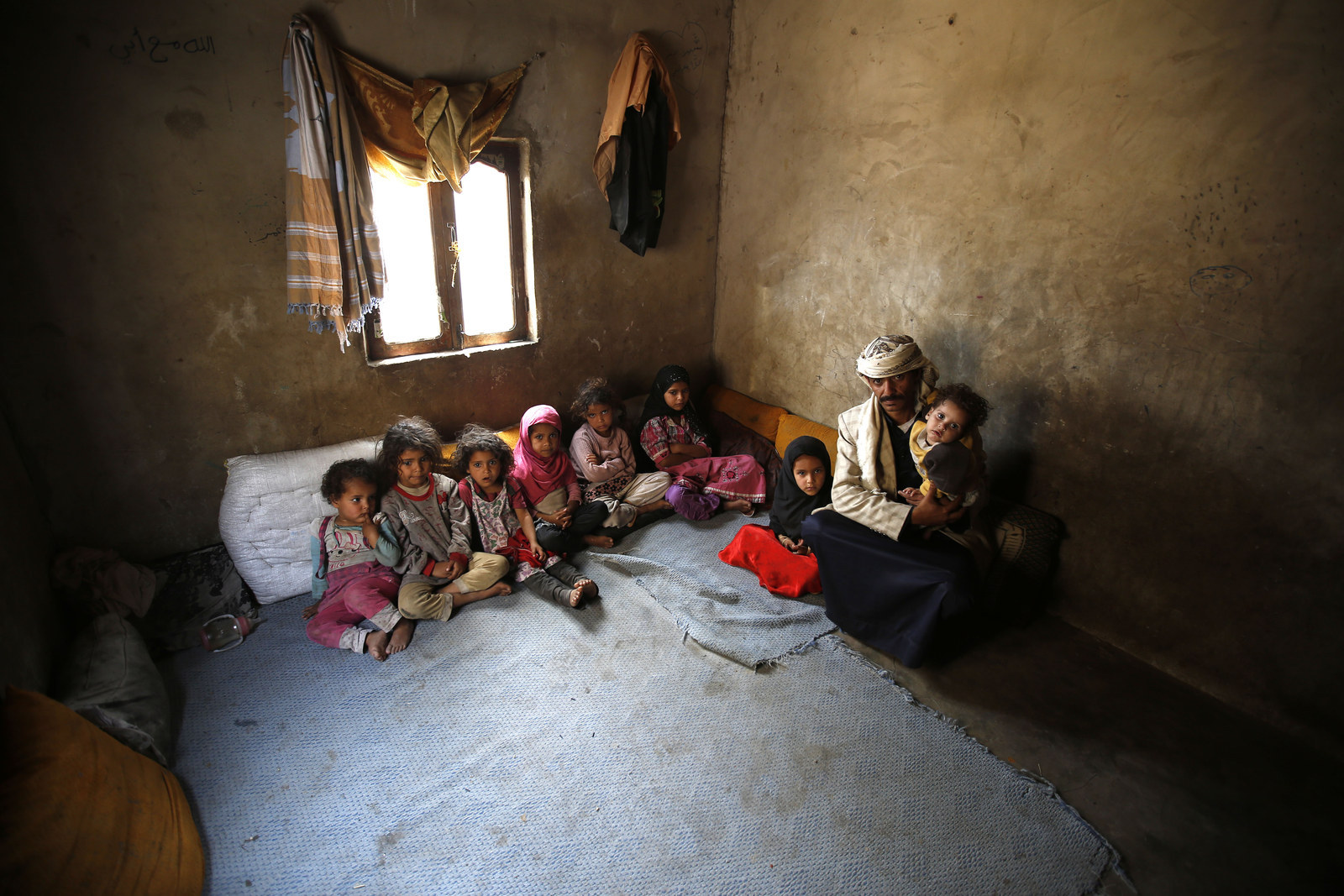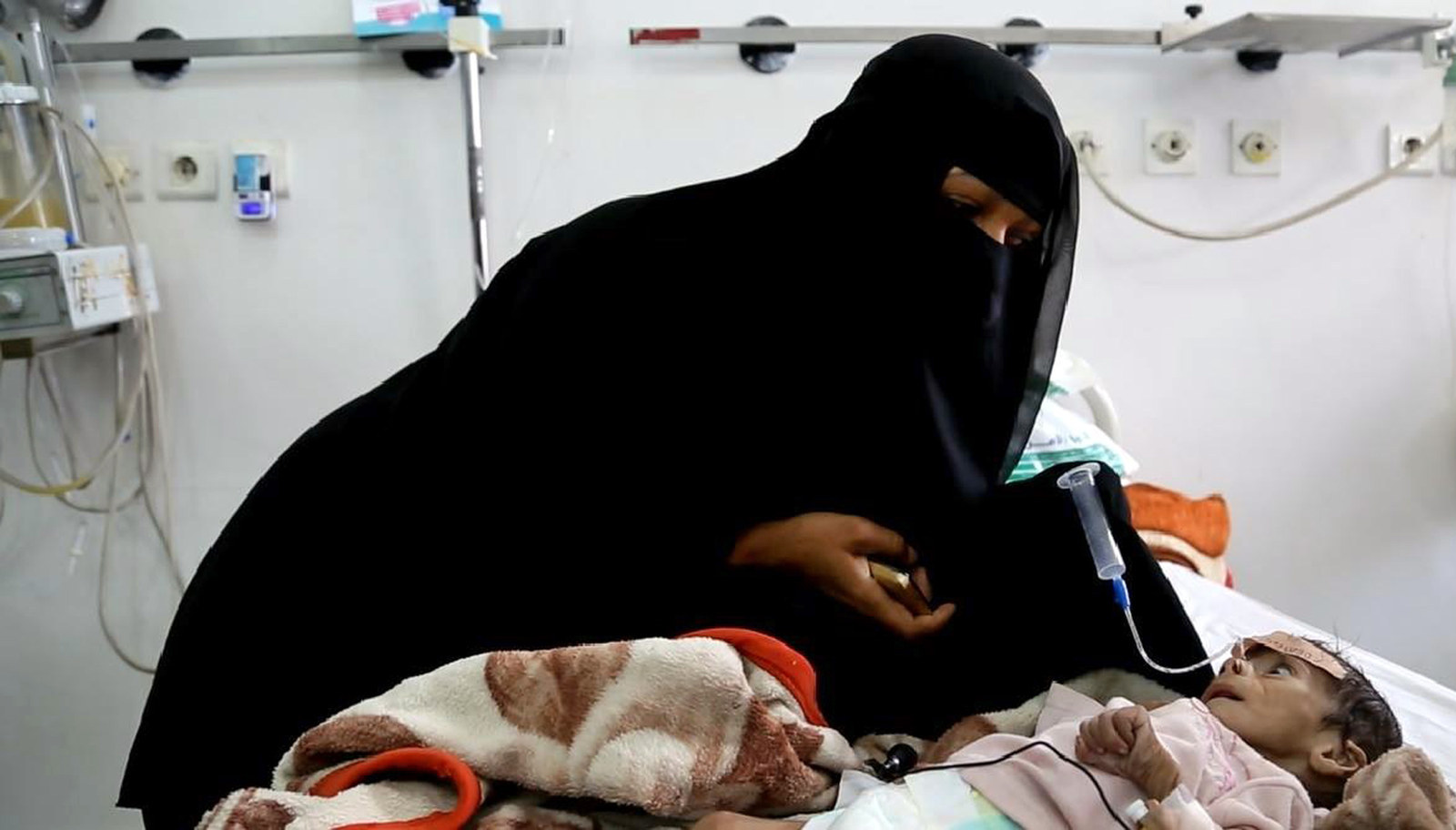
The image of 5-month-old Udai Faisal in a hospital bed didn’t find its way on to newspaper front pages or go viral on the internet like the picture of Alan Kurdi’s drowned corpse did. Yet it is every bit as heartrending. The tiny boy’s wide eyes glare from his skeletal face, his bony hand closed just beneath his chin.
He was admitted to Yemen's al-Sabeen hospital late last month, suffering from malnutrition, diarrhoea and a chest infection, which was where this photograph was taken. Two days later his parents took him out of the hospital. His father said it was because the doctors told him the situation was hopeless, but the head of the hospital's emergency ward told the Associated Press he didn't think the family could afford the medication he needed.
A few days after the picture was taken, Udai died.
"He didn't cry and there were no tears, just stiff," his mother, Intissar Hezzam, said. "I screamed and fainted."
Karlien Kleijier, an emergency manager for Médecins Sans Frontières (also known as Doctors Without Borders, or MSF) who has recently returned from the country, told BuzzFeed News Udai was clearly malnourished – and that the issue of hunger in Yemen was “very real”. According to a recent Unicef report, 320,000 children are at risk of severe acute malnutrition, and 1 million children are projected to suffer from moderate acute malnutrition.
“They need medical care – it’s a giant crisis,” Kleijier told BuzzFeed News. “The health system has collapsed.” Food and medical care had been in short supply before the crisis, according to Kleijier, but the situation has significantly worsened, in large part due to blockades. She said MSF had to increase its staff salaries by 50% in some areas just so they could buy food and supplies. Yemen imports 90% of its food and already had one of the highest malnutrition rates in the world, according to the AP.

Rajhat Madhok, a Unicef worker in Yemen, told BuzzFeed News that an average of six children have been killed or maimed every day in Yemen in the past year. "Children represent one third of all civilian deaths. Those who survive are being recruited to fight in a war not of their making," he said.
Madhok said that in a city called Ibb he had met a mother with 13 children living inside a classroom. "They had fled from Aden and had taken refuge in the school seven months ago," he said. "The family shares space in a classroom with four other families or 20 other women and children."
According to Madhok, there are 2.5 million people across the country who have been displaced from their homes because of the conflict and live with their relatives, with host communities, or in makeshift camps.
Without the direct involvement of Western military forces and increasing danger to journalists on the ground, the war in Yemen is unfolding with little limelight. The battle for Yemen has been raging far longer than most people realise: Skirmishes between Shiite rebels known as Houthis and forces loyal to the government go back over a decade. But the situation that led to ongoing war began last year in February, after Houthi rebels forced the beleaguered president, Abdrabbuh Mansour Hadi, to flee the capital city of Sanaa.
Since then, the Houthis, who have been backed by security forces loyal to the exiled former president Ali Abullah Saleh, have continuously clashed with Hadi, Saleh’s successor, who has the support of local militia and tribespeople in the predominantly Sunni south of the country.
But the overall picture is messy. Both these groups have at various times fought with al-Qaeda in the Arabian Peninsula (a group known as AQAP) and, of late, a Yemen-based affiliate of ISIS. The Houthis took control of the capital, Sana'a, in January this year, forcing the resignation of Hadi, who eventually fled to Aden in the south, from where he has denounced the takeover.

Outside interests complicate the picture further. Hadi says the Houthis are proxies for Iran (both follow forms of Shiite Islam), an allegation denied by Iran. He also claims he was “left with no choice but to call for the assistance of our brothers in Saudi Arabia and other Arab countries".
Airstrikes have claimed thousands of lives, many of them civilians. “Recently 180 people – 22 of them children – were killed in a market. It didn’t even make the headlines," Kleijier told BuzzFeed News. She said international conflict laws were made “so that humanity can continue after the war” and that this was in jeopardy in Yemen.
“We cry out about the incidents in Brussels or Paris – for the people living there it’s no different,” Kleijer said. On top of the death toll from bombs, nearly 10,000 children under the age of 5 have died from preventable diseases.
It’s the Saudi-led coalition offering "assistance" to Hadi — including the UAE, Bahrain, Qatar, and Jordan – that directly ties what is happening in Yemen to the West. The coalition receives intelligence and weapons from the UK and the US. Canada has also sold arms to Saudi Arabia, while France has provided logistical support.
Allegations of war crimes have been levelled at the coalition for months. A UN report in September found that almost two-thirds of the civilians killed in the war between 26 March 2015, when the coalition began its campaign, and June the same year had died due to airstrikes by the coalition. The war has claimed the lives of nearly 900 children and wounded as many as 1,300, largely because of airstrikes, according to Unicef. A report by the UN in January this year found “widespread and systematic” attacks on civilian targets.
In January, MSF spoke out after a number of the charity’s health facilities had come under attack from Saudi-led airstrikes in recent months. Kleijier told BuzzFeed News that “whether it’s the militia or the coalition, we’ve seen an indiscriminate way of executing warfare”. She added: “We’ve seen the use of bombs in densely populated urban areas – even if it’s not intentional, they should be trying damn harder.”

If public outrage has been limited, the political ramifications are substantial. In the US, questions have been asked about what is being achieved by the partnership. In Britain, the House of Commons international development committee has recommended the government suspend all sales of arms to Saudi Arabia “until evidence can be provided that the risk of such arms being used in serious violations of international humanitarian law has subsided”.
It pointed out a paradox at the heart of the British government’s policy: the “important leadership role" the Department for International Development, or DfID, "has played in the humanitarian response, including last week’s pledge to provide an additional £10 million in assistance”, on the one hand, and the sale of £3 billion worth of arms to Saudi Arabia since the start of the crisis.

Not all of the condemnation has been confined to parliament: Anti-arms-trade campaigners have even mounted legal action against the British government.
The government’s response to the UN’s findings has been far from convincing. Foreign secretary Philip Hammond has said he wants to “see the Saudis investigate allegations of breaches of International Humanitarian Law which are attributed to them”, a statement that, in the view of satirical magazine Private Eye, “shows either a touching faith or a desire to cover-up for our friends and customers in Riyadh". In its letter to government, the international development committee had said it was "astonished" at this policy, adding: "It is a longstanding principle of law that inquiries should be independent of those being investigated."
Human Rights Watch has accused Hammond of making “the false and misleading claim that there is no evidence of laws or war violations by the UK’s Saudi ally and other members of the coalition". The head of UNICEF in Yemen has told the British parliament that the bombing "is almost guaranteed to lead to civilian deaths... these are huge bombs dropped into a city of millions of people." As the parliament has noted, the situation is deteriorating not only due to the bombing, but "atrocities" committed by the Houthis.
“We need absolute transparency about the UK’s involvement in the war in Yemen – the public have a right to know if British-built bombs are responsible for civilian deaths," said Angus Robertson MP, who has raised the issue during Prime Minister's Questions, in an interview with BuzzFeed News.
“The world’s attention on conflict in the Middle East has been focused on Syria and Iraq in recent years and sadly the catastrophic war in Yemen has been largely overlooked, even though it too is claiming many lives and causing millions of people to flee their homes and become refugees."
It’s a thorny issue for the British government: The multibillion pound market for Britain to sell arms to Saudi Arabia has existed since 1965. As BuzzFeed News revealed, David Cameron’s governments have overseen the sale of over £5.6 billion of military licenses to Saudi Arabia since 2010, and the economic stakes are huge. There was reportedly a furious row between Michael Gove, the justice secretary, and Hammond, after the former attempted to pull out of a contract to provide advice to the kingdom’s prison regime.
The voting public may conclude that ultimately, the nation’s financial interests should trump potential human rights concerns. But more and more images like those of Udai Faisal will no doubt appear. Those human rights concerns now have a face.
